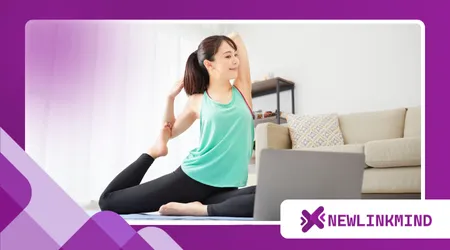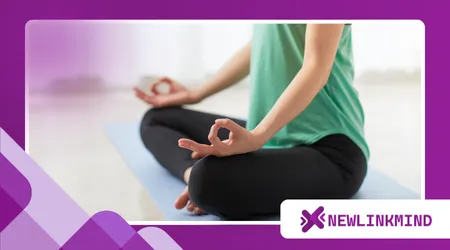Online Yoga Classes vs. Self-Practice: Which Works Better for Your Meditation Goals?

advertisements
The age-old debate of Online Yoga Classes vs. Self-Practice has become more relevant than ever as we seek peace in the digital age.
Finding a path to mindful meditation can feel overwhelming in our fast-paced world. Both paths offer unique benefits for those aiming to deepen their meditation practice.
The question isn’t which is better, but which aligns with your personal goals and lifestyle.
The key to a successful meditation journey is consistency, regardless of the method. Some people thrive on the structure and accountability of a class.
Others prefer the freedom and introspection that comes from a solo practice. Each approach offers a distinct experience, shaping your journey to inner peace differently.
advertisements
The Allure of Structured Learning: Why Online Classes Might Be Your Answer
Online classes provide a structured environment that can be a game-changer for beginners.
A good instructor guides you through poses and breathing techniques, ensuring you maintain proper form. This external guidance is crucial for preventing injury and building a solid foundation.
An instructor’s voice can also keep your mind from wandering.
advertisements
For those who struggle with self-discipline, scheduled classes offer a powerful motivator. Knowing a class starts at a specific time creates accountability.
This sense of commitment helps you prioritize your practice, transforming it from an afterthought into a regular habit. The collective energy of a class, even online, can be surprisingly powerful.
For example, imagine a hectic weekday afternoon. Your motivation is low, and your mind is full of distractions.
However, you’ve signed up for a 5 p.m. online class with your favorite instructor. This commitment acts as a gentle nudge, pulling you onto your mat.
That external structure helps you push past the internal resistance, leading to a practice you might have otherwise skipped.
Read more: How to Prevent Injury While Doing Yoga at Home
The variety of classes available online is also a significant advantage. You can explore different styles of yoga, from Vinyasa to Yin, at your leisure.
This flexibility allows you to customize your practice based on your mood or physical needs. You are no longer limited by the schedule of a single local studio.
The Deep Dive of Solo Exploration: Online Yoga Classes vs. Self-Practice
On the other hand, the profound silence of a self-practice is an experience all its own. Without an instructor’s voice, you learn to listen to your body and mind.
This introspection allows you to move at your own pace, holding poses for as long as feels right. A solo session is a conversation with yourself, a time for deep self-inquiry.
Self-practice demands a high level of self-awareness and discipline. You become your own teacher, tailoring the session to what your body needs on any given day.
This flexibility is perfect for experienced yogis who have a strong understanding of their bodies. It’s a space to explore and experiment, to move beyond established sequences.
The journey of self-practice is an organic one, much like a gardener tending to a plot of land. You know which plants need more water, which thrive in the sun, and which require a gentle touch.
Similarly, in a self-practice, you learn to identify which poses your body craves and which it resists. This intuitive connection deepens over time, making your practice truly personal.
Read here: Digital tools & apps for workplace meditation / mindfulness
A 2023 survey from the Yoga Journal found that over 60% of experienced practitioners incorporate self-practice into their routine, even if they also attend classes.
This statistic highlights the value of carving out personal time on the mat. While online classes build skills, self-practice refines them.
It’s where you take the lessons from the virtual world and apply them to your inner landscape.

A Matter of Goals: Which Path Aligns with Your Meditation?
Deciding between Online Yoga Classes vs. Self-Practice ultimately comes down to your personal meditation goals.
If your primary goal is to establish a consistent routine and learn the fundamentals, classes are an excellent starting point.
They provide a safe, guided environment to build confidence and technique. This foundation is essential for long-term growth.
See how interesting: No-Mind (Mushin): Achieving Effortless Awareness in Morning Meditation
If your goal is to deepen self-awareness and foster a more intuitive connection with your body, self-practice is the superior choice.
It is a more contemplative approach that allows for deeper introspection and true mind-body integration. It’s in this quiet space that you can truly listen to your own needs.
| Feature | Online Yoga Classes | Self-Practice |
| Structure & Discipline | High (Scheduled classes, guided instruction) | Low (Requires self-motivation) |
| Accountability | High (Community, instructor guidance) | Low (Relies on internal drive) |
| Customization | Moderate (Variety of classes) | High (Fully tailored to personal needs) |
| Feedback | Low (Minimal personalized feedback) | High (Internal body feedback) |
| Best For | Beginners, routine building, varied styles | Experienced practitioners, deeper introspection |
It’s not an either/or scenario. Many practitioners find a blend of both to be most effective.
They use online classes for inspiration and technique, then supplement with self-practice to explore and meditate. This balanced approach harnesses the best of both worlds.
The debate of Online Yoga Classes vs. Self-Practice is really about finding your balance.
An urban professional might use online classes to fit practice into their busy schedule. A seasoned yogi might dedicate weekend mornings to deep self-practice.

Finding Your Balance: A Harmonious Approach
The beauty of the digital age is that it has democratized yoga. You now have the power to choose what works for you.
You are no longer limited to the hours of a single studio. So, does a more guided approach or a solo journey better serve your meditation goals?
The answer lies within you. One person’s path to peace might be through the structured guidance of a virtual class, while another’s is found in the quiet solitude of their own home.
It’s about creating a practice that resonates with your unique spirit. The path you choose today might be different from the one you choose tomorrow, and that’s perfectly okay.
The important thing is to simply begin. Whether it’s with the click of a mouse or the quiet unfurling of your mat, the journey to inner peace is always worth the first step.
The discussion about Online Yoga Classes vs. Self-Practice should be a starting point for self-discovery, not a rigid choice.
Frequently Asked Questions Online Yoga Classes vs. Self-Practice
Can I achieve the same meditation depth with online classes as with self-practice?
Yes, you can. The depth of your meditation is more dependent on your intention and focus than the environment.
Online classes can provide a guided focus that helps silence the mind, while self-practice allows you to go deeper into your own internal rhythm.
Is it better to start with online classes or self-practice as a beginner?
For beginners, starting with online classes is highly recommended.
An instructor provides essential guidance on alignment and technique, which helps prevent injuries and builds a strong, safe foundation for future practice.
How do I transition from online classes to self-practice?
A great way to transition is to start with short, unguided sessions. Begin by doing a few sun salutations on your own before or after a class.
Slowly increase the duration of your solo practice as you become more confident in your movements and a stronger sense of your body.
++ yoga at home vs studio yoga for home
++ The advantages (and effectiveness) of online private yoga.
